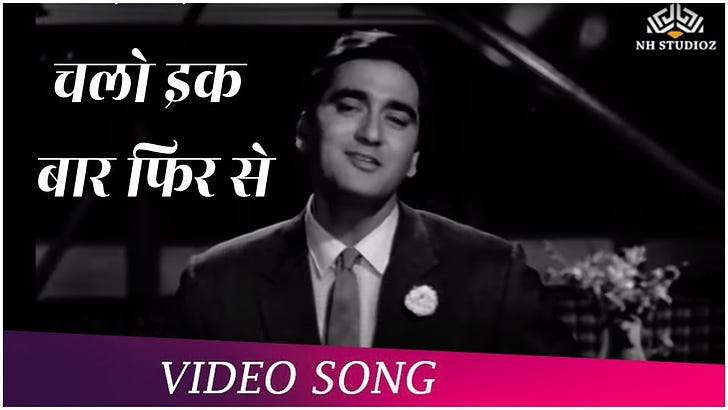What's it with old Hindi songs and pianos?
The party scene with guests dressed in suits was once an obligatory set piece in Hindi films.
The centerpiece a piano, an instrument rarely seen even in affluent homes.
Perhaps the act of being sophisticated, like branding, defined how the rich wanted to be project their elevated status.
The overdressed extras would lounge around with blank expressions on their faces and only the main players would exhibit any signs of emotion.
The songs and the lyrics, however, are timeless treasures.
Take this one - excuse the imperfect translation because the ones who know the song don't need any help.
Chalo Ek baar phir se with Sunil Dutt on the piano, Ashok Kumar as the oblivious husband and Mala Sinha as the one who betrays her beloved.
Let's go back to being strangers again
I won't expect anything of you
And read anything wrong from your glances
My voice quivers just as often as my heart skips a beat
If the affliction becomes a disease, it is best forgotten
And rather than carry a burden, let it shatter
If this road leads nowhere,
Let's leave it at a beautiful point where they diverge forever.
Lovers becoming strangers again. It is one of the finest expressions of loss, of experiences that are treasured but should be forgotten.
Few songs describe a breakup in such powerful terms. To see the person you love turn into a stranger you don't recognise.
At some point, the piano and the artificial staging stop being consequential. The hard edges of poignant loss cut deep.
Every single individual has been through it at some point in life.
And that is the song's biggest strength and its staying power
Where did conventional families disappear in the US?
Around 1975, 37% of households in the US were married couples with children
That has dropped by almost 50% to 21% in 2021.
In the next few decades, it flipped.
In 2021, 28% of households in the US comprised of singles. And 22% of married couples without kids.
Together, they add up to 50%
Back in the 70s, the population explosion was the big worry for governments. If people kept having children, the world would become an extremely crowded place, stretching everything to the limit - infrastructure, services, schools, resources.
But at some point, the number of people having children has dropped gradually over the years before it became a concerning statistic.
All financial systems and workplaces are built on the family units of the past and if that no longer holds, how does the system grow and sustain itself?
None of these effects and how they play out can be predicted.
Composite households where people live together because they attend college or work has now increased - doubled from 6% to 11%.
But it's a temporary arrangement with people leaving and others coming in. Strangers or acquaintances sharing a roof, which is different from the family living or sharing a home.
Planning policy, housing and schools for this diverse set of living requirements is a challenge in itself.
The meaning of the word family is undergoing a fundamental change as well. And that is not captured in this set of statistics.
If fewer people get married and fewer children are born, the long-term effects can't be predicted. Or how each of these will cascade into other social structures.
Whether this will similarly play out in countries like India, where family ties are the foundation remains to be seen.
And new generations have to work out their own solutions.
The prank movement that launched a category
Most markets are built by trying to entice people to buy a product.
But bike sharing had revolutionary origins, back in the 60s.
A group of teenagers went around painting bikes white to protest the use of polluting cars.
It's hard to imagine teenagers in India doing it because cars until recently were aspirational symbols of upward mobility
By using cycles, people were affirming their love for the environment.
It didn't fall into place flawlessly because leaving bikes unlocked back then was prohibited by law.
The police ended up confiscating the first lot of bikes left in various places.
But in bits and pieces over the years, like being featured in a John Lennon song, The White Bicycle, the symbolism and some of the practical uses of bike sharing began to make an impact.
At the Hoge Veluwe National Park, there have been dockless bikes for use by the public since 1974.
The next generation of bikesharing introduced coins or tokens to unlock bikes and then, bowing down to the technology of the times, chip embedded cards rather than tokens took over.
Amsterdam has grown into one of the only urban centres that prioritize biking over the use of cars and that has come with steady pushback from the public.
While it is a great way to get around the last mile, especially in crowded urban centers, it has not really taken off in other cities, except in pockets.
That may have more to do with the convenience and the signaling that cars enable about status.
Bikes don't have flaunt value except for the environmental badge. And governments earn far more revenue from the automobile industry than they would from bicycles.
The return to bikes is not a priority.


